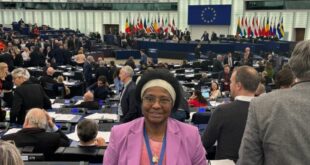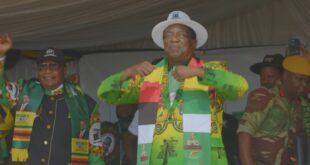Emmanuel Macron and Marine Le Pen qualified for the second round of the French presidential election on Sunday (23 April), in a vote that confirmed French voters’ will to repudiate the current political system.
Macron, a social-liberal who entered politics only a year ago and does not have an organised party, finished first with 23.90 percent of the votes. The far-right Marine Le Pen, who had been leading polls for more than a year until a few days ago, came second with 21.70 percent.
The vote, in which 77.30 percent of registered voters took part, gave a sweeping result against the candidates of the two main traditional parties.
Benoit Hamon, from the Socialist party of outgoing Ppresident Francois Hollande, suffered what he “called a historical sanction” with 6.20 percent.
Hamon, who ran on a political line that was critical of Hollande, said that the sanction was also “legitimate”.
The conservative candidate, Francois Fillon, was also kicked out by voters, who put him in the third place, with less than 20 percent of the vote (19.70%).
Fillon, a former prime minister under Nicolas Sarkozy, was a one-time favourite for the election but he was weakened by charges over alleged fake parliamentary jobs.
Fillon came only slightly ahead of Jean-Luc Melenchon, a radical left firebrand who benefited from the socialists’ divisions and Hamon’a failure to embody a vote for the left.
Both Macron and Le Pen said they represented a new kind of leader for France.
“We have changed the face of French politics,” Macron told his supporters, mainly young people, who were gathered in a large hall in Paris where loud music was playing.
He said that the challenge” in the run-off would be “to decide to break completely with a system that has been unable to address our country’s problem for more than 30 years”.
He said that he wanted to be a “president who protects, who transforms and who builds” and that he wanted to represent a “path of hope” for a “strong Europe”.
He insisted that he wanted to “unite” the French people and that he would be the “president of the patriots in the face of the nationalists’ threat”.
Speaking from Henin-Beaumont, in northern France, one of the towns were the mayor is from her National Front (FN) party, Le Pen said that the vote was “an act of French pride”.
She encouraged voters to vote for “the great change, the fundamental change”, adding that she wanted to free the French people from arrogant elites who want to dictate it what to do”.
“Yes, I am the candidate of the people,” she said.
“What is at stake is the survival of France,” she said, calling on voters to “choose borders that protect France’s identity”.
Fifteen years after Jean-Marie Le Pen shocked France and the world by qualifying to the second round, his daughter’s second place was welcomed by many with a sigh of relief as a lesser evil.
Politicians from the defeated mainstream parties quickly called to form a so-called republican front to prevent Le Pen from behind elected.
Prime minister Bernard Cazeneuve said that the result called for “a clear and strong position” and called French voters to elect Macron.
Hamon also called to vote for Macron, “even if he doesn’t represent the left”.
Fillon was clear, and told his supporters that is was his “duty” to say that he would vote for Macron.
“There is no other choice than voting against the far-right,” he said.
He said that the National Front was “known for its violence and intolerance” and would bring “chaos to the EU” by pulling France out of the euro.
Melenchon said he would recognise the results only when he sees the final official figures and said he has “no mandate” from his voters to give voting instructions for the run-off.
He said that however that “mediacrats and oligarchs jubilate” over the vote’s outcome.
According to a first opinion poll published on Sunday evening, Macron would beat Le Pen in the second round on 7 May by 62 percent against 38.
Eric Maurice /EUobserver
 THE AFRICAN COURIER. Reporting Africa and its Diaspora! The African Courier is an international magazine published in Germany to report on Africa and the Diaspora African experience. The first issue of the bimonthly magazine appeared on the newsstands on 15 February 1998. The African Courier is a communication forum for European-African political, economic and cultural exchanges, and a voice for Africa in Europe.
THE AFRICAN COURIER. Reporting Africa and its Diaspora! The African Courier is an international magazine published in Germany to report on Africa and the Diaspora African experience. The first issue of the bimonthly magazine appeared on the newsstands on 15 February 1998. The African Courier is a communication forum for European-African political, economic and cultural exchanges, and a voice for Africa in Europe.

































